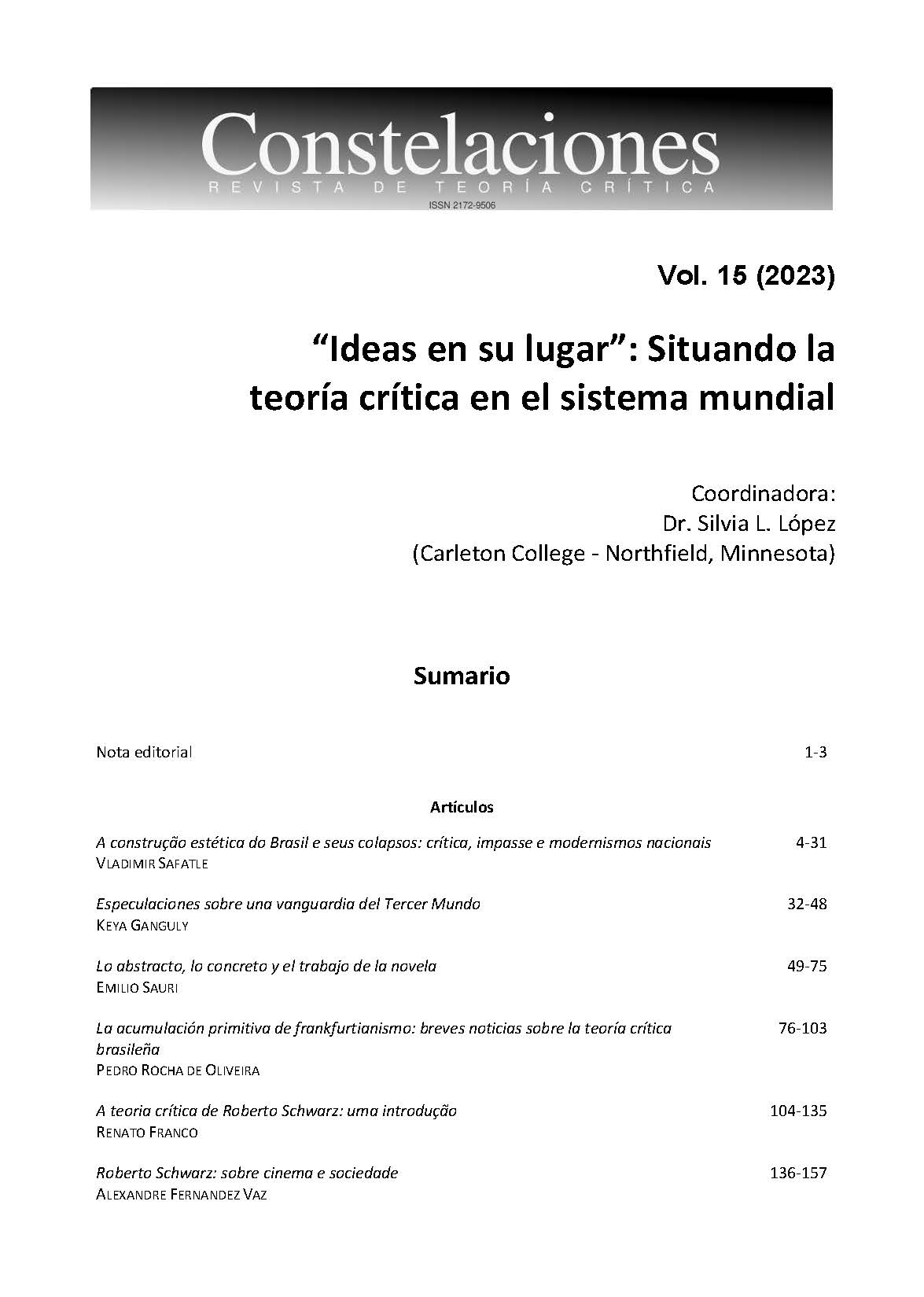The Aesthetic Construction of Brazil and its Collapses: Critique, Impasse and National Modernisms
Keywords:
Brazil, aesthetic modernisation, populist state, developmentalism, modernism, architecture, anthropophagic pact, tropicalism, dark modernismAbstract
One of the fundamental axes of Brazil's national construction is the use of aesthetic modernisation as a force for the redefinition of space, time and territory. This aesthetic construction has three matrixes, three modernisms that are articulated in a complex relationship of conflict: architectural modernism as national modernisation organised within the conciliatory perspectives of the populist state, the modernism that attempts to reconcile aesthetic aspirations and the monopolistic formation of the culture industry, and the "dark modernism" that we find in integralism. Such matrices, in a way, still guide our horizon of social expectations or its atrophy. National critical thinking depends on aesthetic productivity and its limits. It will only succeed in finding new critical figures when the country is finally able to assume for itself the project of a consistent aesthetics of irreconciliation.
Downloads
References
ARANTES, Paulo (2021): Sentimento da dialética na experiência intelectual brasileira: dialética e dualidade segundo Antonio Candido e Roberto Schwarz [recurso eletrônico]. São Paulo: [s.n]. https://sentimentodadialetica.org/dialetica/catalog/view/87/118/268
ARANTES, Otília e Paulo (1997): Sentido da formação, São Paulo: Paz e Terra.
BADIOU, Alain (2014): Logiques de mondes, Paris: Seuil.
BARDI, Lina (1994): “Um balanço dezesseis anos depois”, Tempos de grossura: o design no impasse. São Paulo: Instituto Lina Bo e P. M. Bardi.
BENSE, Max (2009): Inteligência brasileira, São Paulo: Cosac e Naify.
CHAPOUTOT, Johann (2016): La révolution culturelle nazie, Paris: Gallimard.
COSTA, Lúcio (1995): Registro de uma vivência, Empresa das Artes.
COSTA, Lucio (2018): Registro de uma vivência, São Paulo: Editora 34/Sesc.
FURTADO, Celso (2002): Formação econômica do Brasil, São Paulo: Companhia das Letras.
FURTADO, Celso (2012): Ensaios sobre cultura e o Ministério da Cultura, Rio de Janeiro: Contraponto.
GORELIK, André (2005): Das vanguardas a Brasília: cultura urbana e arquitetura na América Latina, Belo Horizonte: Editora da UFMG
LACLAU, Ernesto (2014): La razón populista, Ciudad del México: Fondo de Cultura Econômica.
OITICICA, Hélio (1968): “O herói anti-herói e o anti-herói anônimo”, https://vocabpol.cristinaribas.org/anti-heroi-anonimo/
OITICICA, Hélio (1986): Aspiro ao grande labirinto, Rio de Janeiro: Rocco.
PEDROSA, Mario (2014): Arquitetura: ensaios críticos, São Paulo: Cosac e Naify.
SALLES GOMES, Paulo Emílio (1973): Cinema: trajetória do subdesenvolvimento, São Paulo: Paz e Terra.
SANTOS, Marco Antonio (2010): Heitor Villa-Lobos: textos selecionados, Recife: Fundação Joaquim Nabuco.
SCHWARZ, Roberto (1998): Martinha e Lucrécia, São Paulo: Companhia das Letras.
WISNIK, Guilherme (2018): O Brasil condenado ao moderno: do desenvolvimentismo de Estado aos grupos contraculturais. São Paulo: FAU-USP, 2018 (Tese de Livre-Docência).
VELOSO, Caetano (1992): Verdade tropical, São Paulo: Companhia das Letras.
Downloads
Published
How to Cite
Issue
Section
License
Copyright (c) 2023 Vladimir Safatle

This work is licensed under a Creative Commons Attribution-NonCommercial-ShareAlike 4.0 International License.
Authors who have publications with this journal accept the following terms:
1. Authors will retain their copyright and grant the journal the right of first publication of their work, which will be simultaneously subject to the License of recognition of Creative Commons CC BY-NC-SA 4.0 that allows third parties to share, redistribute and adapt the work provided it is for non-commercial purposes and its author and first publication in this journal is indicated.
2. Authors may adopt other non-exclusive distribution license agreements for the version of the published work (e.g., depositing it in an institutional electronic archive or publishing it in a monographic volume) provided that the initial publication in this journal is indicated.
3. Authors are permitted and encouraged to disseminate their work via the Internet (e.g., in institutional telematic archives or on their website) before and during the submission process, which can produce interesting exchanges and increase citations of the published work. (See The Effect of Open Access).
Data confidentiality
1. Constelaciones. Revista de Teoría Crítica guarantees that the data you send us will only be used to meet the requests made in this message.
2. Your data will not be passed on to third parties.
3. You may request that your data be removed from our records at any time.





